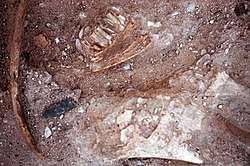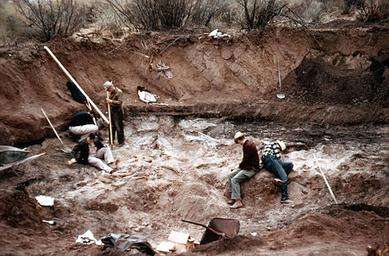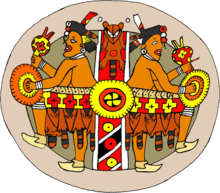Lehner Mammoth-Kill Site
The Lehner Mammoth-Kill Site is a location in southern Arizona that is significant for its association with evidence that mammoths were killed here by Paleo-Indians 9000 years BCE.
Lehner Mammoth-Kill Site | |
 Clovis point in situ near a bison
mandible and mammoth bone at the Lehner site, 1955. Higher-resolution photo linked at source. | |
  | |
| Nearest city | Hereford, Arizona |
|---|---|
| Coordinates | 31°26′N 110°6′W |
| Website | Lehner Mammoth-Kill Site |
| NRHP reference No. | 67000002 |
| Significant dates | |
| Added to NRHP | May 28, 1967[1] |
| Designated NHL | May 28, 1967[2] |
In 1952, Ed Lehner discovered extinct mammoth bone fragments on his ranch, at the locality now known as the Lehner Mammoth-Kill Site. He notified the Arizona State Museum, and a summer of heavy rains in 1955 exposed more bones. Excavations took place in 1955-56, and again in 1974-75. In the first season, two Clovis projectile points were found among the ribs of a young mammoth.[3]
Artifacts found during these excavations included thirteen fluted Clovis culture projectile points, butchering tools, chipped stone debris and fire hearth features.
Bones of a variety of game—twelve immature mammoths, one horse, one tapir, several bison, one camel, one bear, several rabbits, and a garter snake—were excavated at the Lehner site.
The Lehner Mammoth kill and camp site exhibited a number of firsts: It was the first site associated with the Clovis culture to have definable fire hearths. These hearths provided the first radiocarbon dates for the culture (9,000 BCE).
This site was also the first to have butchering tools in direct association with animal remains, and the first Clovis association with small animals, camel, and tapir.
In addition to the obvious artifact remains, an inter-disciplinary group of scientists including archaeologists, botanists, geochronologists, geologists, paleontologists, palynologists, and zoologists have studied and interpreted a wide range of data from the site.[4]
The Lehner Mammoth-Kill Site was declared a National Historic Landmark in 1967.[2]
In 1988, Mr. and Mrs. Lehner donated the site to the Bureau of Land Management for the benefit and education of the public.[4]
See also
References
- "National Register Information System". National Register of Historic Places. National Park Service. January 23, 2007.
- "Lehner Mammoth-Kill Site". National Historic Landmark summary listing. National Park Service. Retrieved 2007-09-27.
- "Lehner Mammoth-Kill Site". Archived from the original on 2008-01-01. Retrieved 2009-05-07.
- Bureau of Land Management-Lehner Mammoth Kill Site. This article incorporates public domain text from this US government website.
External links
| Wikimedia Commons has media related to Lehner mammoth kill site (Cochise County, Arizona). |
- Bureau of Land Management-Lehner Mammoth Kill Site
- Lehner Mammoth-Kill Site in The Paleo-Indians
- Obituary, Edward Lehner (1914–2003)

